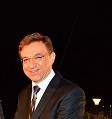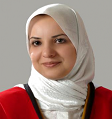Day 1 :
Keynote Forum
Ernesto Miguel Delgado Cidranes
Complutense University Madrid, Spain
Keynote: The power of magnetic stimulation in the control of pelvic floor disorders: Brainsway deep TMS therapy and BTL EMSELLA protocols
Time : 09:10-10:00

Biography:
Abstract:
Keynote Forum
Hischam Bassiouni
Klinikum St Marien Amberg, Germany
Keynote: Application of new techniques in neurosurgery for improving patients outcome and postoperative life quality
Time : 10:00-10:50

Biography:
Abstract:
Keynote Forum
Sawsan Abuhamdah
Al Ain University of Science and Technology, United Arab Emirates
Keynote: Vanillin attenuated behavioral impairments, neurochemical deficts in a mouse model of Alzheimer’s disease
Time : 11:20-12:10

Biography:
Sawsan Abuhamdah is a Jordanian Registered Pharmacist. She has completed her PhD from Durham University, UK and Postdoctoral studies from Granada Medical School, Department of Pharmacology, Spain and has won Postdoctoral Fulbright Research Award at the University of Toledo, Department of pharmacology and experimental therapeuticsSawsan Abuhamdah is a Jordanian Registered Pharmacist. She has completed her PhD from Durham University, UK and Postdoctoral studies from Granada Medical School, Department of Pharmacology, Spain and has won Postdoctoral Fulbright Research Award at the University of Toledo, Department of pharmacology and experimental therapeutics, Ohio, USA. She worked as an Associate Professor at the Faculty of Pharmacy, University of Jordan and now is currently working as a Deputy Dean, College of Pharmacy, Al Ain University of Science and Technology, Abu Dhabi, UAE. She has published many research articles in peer-reviewed journals. She is also a Member of the British Pharmacological Society (BPS), British Neuroscience Association (BNA), Sigma Phi Sigma pharmaceutical Sciences Honor Society, University of Toledo, USA, Jordan Pharmaceutical Association. She has been serving as an Editorial Board Member of reputable pharmaceutical journals., Ohio, USA. She worked as an Associate Professor at the Faculty of Pharmacy, University of Jordan and now is currently working as a Deputy Dean, College of Pharmacy, Al Ain University of Science and Technology, Abu Dhabi, UAE. She has published many research articles in peer-reviewed journals. She is also a Member of the British Pharmacological Society (BPS), British Neuroscience Association (BNA), Sigma Phi Sigma pharmaceutical Sciences Honor Society, University of Toledo, USA, Jordan Pharmaceutical Association. She has been serving as an Editorial Board Member of reputable pharmaceutical journals.
Abstract:
Background: Alzheimer's Disease (AD) is a progressive neurodegenerative disease where symptoms appear after significant neuronal loss. Current treatments for AD do not significantly alter the disease process, where they temporarily improve symptoms. In vitro data has indicated that low doses of vanillin reduce beta-amyloid aggregation and may possess cytoprotective effects. This research aims to investigate the effect of vanillin on the AlCl3 mouse model of AD and thus its possible usefulness in managing AD.
Method: Male albino mice were divided into 8 groups of 10. Each group received different treatments of AlCl3, AlCl3+vanillin (30, 60 or 120 mg kgG1 day G1), vanillin alone and control. These experiments lasted for 30 days after which animals were subjected to behavioral and neurochemical assessment. Analysis was carried out using one way analysis of variance (ANOVA) with Dunnett's post-test.
Result: Lower doses of vanillin led to improvements in behavioral and neurochemical deficits induced by AlCl3. Conversely, a high dose of vanillin caused an exaggeration in the behavioral and neurochemical deficits induced by AlCl3. Furthermore, highest dose vanillin treatment, on its own, inflicted behavioral and neurochemical deficits comparable to those caused by AlCl3.
Conclusion: It is concluded that vanillin negatively impacted cholinergic neuronal survival. Any marked benefits with lower doses of vanillin were attributed to its ability to indirectly increase synaptic acetylcholine abundance through blocking its degradation.
